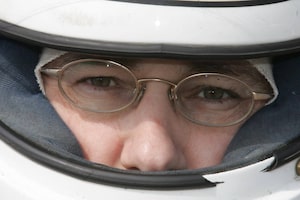A crane carries the Sauber Formula One car of Esteban Gutierrez off the track following the Canadian F1 Grand Prix at the Circuit Gilles Villeneuve in Montreal June 9, 2013. A race-track worker was killed after he slipped under the wheel of the crane at the end of the event.CHRISTINNE MUSCHI/Reuters
When a track worker died in Montreal during the Canadian Grand Prix, it made headlines around the world; when they do their job flawlessly, nobody really notices.
That's the reality of giving your time to make events like the Canada's Formula One race possible.
Noticed or not, track workers are key players in every racing weekend, toiling long hours for zero pay and putting themselves at risk every time they take their posts.
"They really are the unsung heroes of our sport," said IndyCar driver James Hinchcliffe of Oakville, Ont., who drives the Go Daddy car for Andretti Autosport.
"Not only do they have probably the most important job of all, they are volunteers. Nobody has a greater, selfless passion for the sport than they do and none of us would be privileged enough to do what we do without them."
Mark Robinson, 38, died on Sunday after a freak accident near the end of the Canadian Grand Prix at Montreal's Circuit Gilles Villeneuve. The corner worker was helping with the removal of a car when he dropped his radio and stumbled as he tried to pick it up. He fell under the wheels of the crane that was moving the Sauber of Esteban Gutiérrez and died in hospital a few hours later of his injuries.
It was the third track worker death in Formula One since 2001. It was also the third fatality at a major Canadian racing event. A marshal died during the 1996 Toronto Molson Indy when he was hit by a wheel that flew off rookie Jeff Krosnoff's car. Krosnoff was also killed in the crash. Six years earlier, a marshal lost his life in the Vancouver Indy when he was struck by car as he tried to push another out of a danger zone.
While their work often blends into the background, racing drivers understand the contribution track workers make every weekend. There's no doubt that thousands of racers owe their lives to the timely intervention of a track worker, whether it's waving a yellow flag to warn of danger, putting out a fire after an accident or pushing a car and driver out of a dangerous spot.
"As a driver, they are incredibly important: They are your eyes as you are approaching a corner and they go in when there is still racing going on to assist a wounded car or driver in need – it's very selfless to do that," said Canadian veteran racer Ron Fellows, who also co-owns Canadian Tire Motorsport Park in Bowmanville, Ont.
"They put in long days, there's risk involved, and they are not just there to help the drivers, they are there for spectators too. They are under-appreciated, but certainly from my side of it, they are very much appreciated."
By all accounts, Robinson was the typical track worker and not unlike many of the 825 volunteers occupying flag stands and making up safety teams at the Circuit Gilles Villeneuve this year. He wanted to be a part of a racing event and volunteered to put himself in harm's way to play a key role in making the Canadian Grand Prix a success.
"They love racing so much and they want to be involved," said reigning IndyCar champion Ryan Hunter-Reay, who is Hinchcliffe's teammate at Andretti Autosport.
"They're there looking after the driver's safety and the crew's safety and that's part of it, so it's very sad news for Montreal."
These volunteers don't just run out to a flag stand unprepared and wave the yellows when they see a crash. They also give up their spare time to put in days of training in addition to standing for hours in all kinds of weather conditions, ready to step in if needed.
In Toronto, every IndyCar track worker for the Honda Indy in July is a member of the British Automobile Racing Club. Each is trained and licensed to meet the guidelines of the sport's overarching governing body, the Fédération Internationale de l'Automobile. Robinson was a member of the Automobile Club de l'Ile Notre Dame.
Simply put, without volunteers like Robinson, staging events at racetracks would become a near impossible task.
"Well, without them, I can tell you, it doesn't happen, especially with the volunteers," said former racer turned team owner and race promoter Michael Andretti, who will also be running the IndyCar event in Milwaukee this weekend.
"We have 200 to 300 volunteers that come out and help, and if we didn't have them, there would be no event. So they are very, very important to these events. We're all one big family in the end in auto racing. It is a small world, so you definitely feel it when something like that happens."
During next month's Honda Indy Toronto there will be roughly 200 on-track volunteers, course workers and track marshals making sure that it's a safe race for everyone involved.
And while the drivers will get all the applause and glory, race president Charlie Johnstone hopes fans take a moment to think about the men and women who make it all possible.
"Volunteers are the heart and soul of the Honda Indy Toronto," said race president Charlie Johnstone.
"It's a stressful environment that does indeed have inherent hazards. Our hearts and prayers go out to the family, friends and co-workers of the fallen volunteer in Montreal."
For more from Jeff Pappone, go to facebook.com/jeffpappone (No login required!)
Twitter: @jpappone
 Jeff Pappone
Jeff Pappone